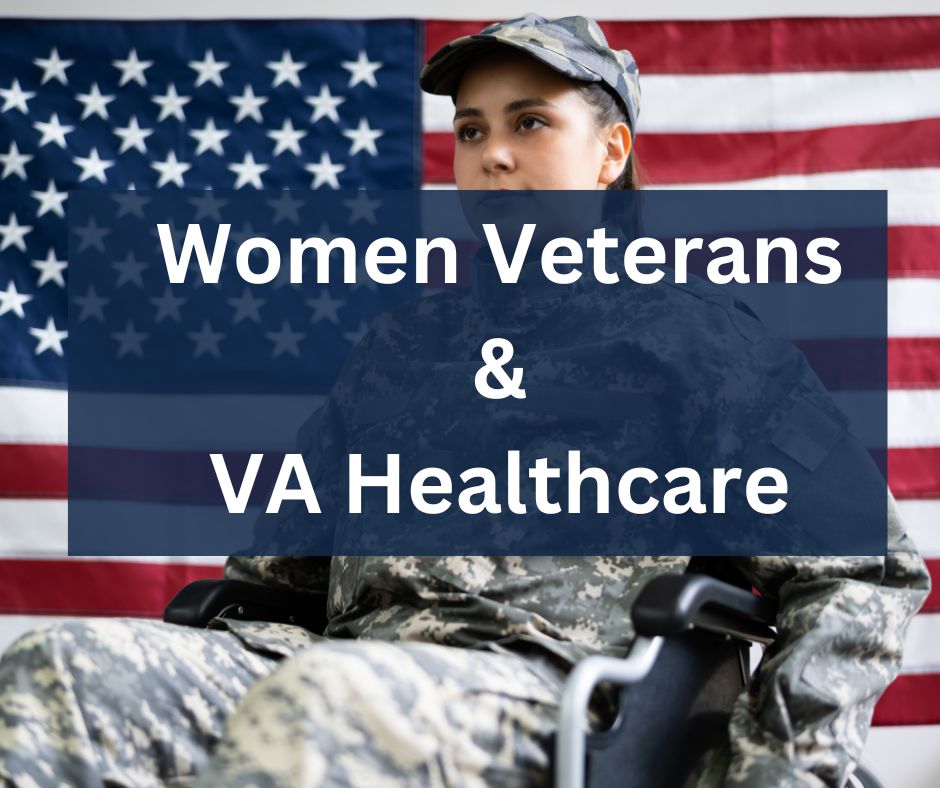Beyond the Battlefield: Women Veterans and the Future of VA Healthcare
From the courage displayed on the battlefield to the resilience demonstrated on the homefront, women veterans have long been the unsung heroes in need of specialized care. Today, we embark on a journey to explore the future of VA healthcare and how it can better support these incredible women beyond their service. Together, let’s look at the evolving landscape of VA healthcare and the innovative solutions being developed for a brighter future.

Recognizing the Unique Needs of Women Veterans:
Women veterans have distinct needs that arise from their experiences serving in the military and transitioning back into civilian life. Understanding and addressing these unique needs is crucial to providing effective and comprehensive healthcare. Here are some key areas where the needs of women veterans differ:
- Gender-Specific Healthcare: Women have unique healthcare requirements, including reproductive health, contraception, and menopause management. Access to gender-specific care is essential for women veterans to maintain their overall well-being.
- Mental Health and Trauma: Women veterans often face mental health challenges, such as post-traumatic stress disorder (PTSD), depression, and anxiety. The trauma they may have experienced during their military service requires specialized support and therapeutic interventions tailored to their unique circumstances.
- Military Sexual Trauma (MST): MST refers to any sexual harassment, assault, or violence experienced during military service. Women veterans are at a higher risk of MST, and addressing the physical and psychological consequences of such trauma is critical for their recovery and reintegration into civilian life.
- Reproductive Health and Family Planning: Women veterans may have specific needs related to pregnancy, childbirth, and family planning. Access to comprehensive reproductive health services, including prenatal care, fertility preservation, and postpartum support, is essential to address their reproductive health concerns.
- Combat Roles and Injuries: Women are increasingly serving in combat roles, exposing them to physical injuries and the long-term consequences of combat-related exposures. Specialized care is needed to address combat-related injuries and ensure proper rehabilitation and support.
- Caregiver Roles: Women veterans often take on caregiver roles for their families, including children, spouses, or elderly parents. Balancing their own healthcare needs with caregiving responsibilities requires tailored support and resources.
- Homelessness and Housing: Homelessness among women veterans is a pressing issue that requires attention. Providing safe and supportive housing options specifically designed for women veterans is crucial to addressing their unique circumstances and preventing homelessness.
- Military Culture and Stigma: Women veterans may face unique challenges related to the stigma associated with their military service and combat roles. Addressing the cultural and societal barriers they encounter is essential to ensure they feel comfortable seeking and receiving the care they need.
By recognizing and understanding these unique needs, the VA healthcare system can develop targeted programs, allocate appropriate resources, and provide specialized care to effectively support the health and well-being of women veterans. It is through this comprehensive approach that we can honor their service and ensure they receive the respect, dignity, and quality healthcare they deserve.
Challenges Faced by Women Veterans in Accessing Quality Healthcare:
While the VA healthcare system strives to provide comprehensive care to all veterans, women veterans often encounter specific challenges that hinder their access to quality healthcare. It is crucial to address these challenges to ensure equitable and effective healthcare services for women veterans. Here are some key challenges they face:

- Lack of Gender-Specific Services: Historically, the VA healthcare system was predominantly designed to cater to male veterans. This lack of gender-specific services has resulted in gaps in care for women veterans. The unique healthcare needs of women, including reproductive health, contraception, and menopause management, may not be adequately addressed or readily available within the system.
- Limited Access and Awareness: Women veterans, particularly those in rural areas, may face limited access to VA healthcare facilities. Distance, transportation barriers, and a lack of awareness about available services can prevent women veterans from seeking and receiving the care they require. Increasing awareness and improving accessibility to VA healthcare services are vital to overcoming this challenge.
- Gender Disparities in Healthcare Delivery: Women veterans may experience gender disparities in healthcare delivery within the VA system. This can manifest in longer wait times for appointments, insufficient provider knowledge and training regarding women’s health issues, and a lack of specialized clinics or providers to address their unique healthcare needs.
- Stigma and Perception: Some women veterans may encounter stigma or biased perceptions about their military service, combat roles, or healthcare needs. This can create a barrier to seeking care or sharing their experiences openly. Addressing and challenging these stigmas through education, awareness campaigns, and cultural sensitivity training can help create a more inclusive and supportive healthcare environment.
- Mental Health and Military Sexual Trauma (MST): Women veterans are at a higher risk of experiencing mental health conditions, including PTSD, depression, and anxiety, often stemming from their military service. Additionally, the prevalence of military sexual trauma (MST) among women veterans can lead to unique mental health challenges. However, there may be a lack of specialized resources and trained providers to address these specific mental health needs effectively.
- Care Coordination and Transition to Civilian Life: Transitioning from military service to civilian life can be complex and overwhelming for women veterans. The process of navigating the healthcare system, coordinating care, and transitioning from military to VA healthcare services can present challenges. Improved care coordination, streamlined processes, and tailored support during this transition period are essential to ensure continuity of care.
- Cultural Competency and Sensitivity: Women veterans come from diverse backgrounds and may have unique cultural needs or preferences that influence their healthcare experiences. Culturally competent care that respects and addresses these individual differences is vital to provide effective and patient-centered healthcare services.
Addressing these challenges requires a comprehensive approach that includes targeted policies, increased provider education and training, improved access to gender-specific services, enhanced care coordination, and a focus on cultural competency. By recognizing and actively addressing these challenges, the VA healthcare system can ensure that women veterans receive the quality and equitable healthcare they deserve.
Advancements in VA Healthcare Tailored to Women Veterans:
Over the years, the VA healthcare system has made significant advancements to better meet the unique needs of women veterans. Recognizing the importance of gender-specific care, the VA has implemented various initiatives and programs aimed at improving healthcare services for women veterans. Some of the key advancements in VA healthcare tailored to women veterans include:
- Women’s Health Clinics
- Comprehensive Primary Care
- Gender-Specific Research Centers
- Comprehensive Reproductive Healthcare
- Training and Education
Closing the Gender Gap:
Addressing the gender gap in women’s VA healthcare is crucial to ensure equitable access to high-quality and comprehensive care for women veterans. Historically, the VA healthcare system has primarily focused on the needs of male veterans, leading to disparities and gaps in healthcare services for women veterans. However, significant efforts have been made to bridge this gap and provide gender-responsive care. Here are key initiatives aimed at closing the gender gap in women’s VA healthcare:
- Enhanced Provider Training
- Women Veteran Program Managers
- Research and Data Collection
Promoting Equality in VA Healthcare:
Equality in healthcare is not just a lofty ideal; it is a fundamental right. We shed light on the gender gap that exists within the VA healthcare system and discuss the importance of promoting equality. By advocating for gender-sensitive policies, we can ensure that women veterans receive the same level of care and support as their male counterparts.
Holistic Care: Addressing Mental Health and Trauma Among Women Veterans:

Mental health and trauma are significant concerns for women veterans, and providing holistic care is crucial to support their overall well-being. Women veterans often face unique challenges related to their military service, including combat exposure, military sexual trauma (MST), and the complexities of transitioning back into civilian life. Here are some key aspects to consider when addressing mental health and trauma among women veterans:
- Trauma-Informed Care: Women veterans may have experienced various types of trauma during their military service. Adopting a trauma-informed approach to care involves recognizing the impact of trauma and creating a safe and supportive environment that promotes healing and recovery. Trauma-informed care encompasses sensitivity to triggers, understanding the effects of trauma on mental health, and providing evidence-based interventions tailored to each individual’s needs.
- Screening and Assessment: Early identification and assessment of mental health concerns are essential to provide timely and appropriate care. Women veterans should undergo comprehensive mental health screenings that consider the unique challenges they may have encountered during their service, such as combat exposure and military sexual trauma. This allows healthcare providers to identify and address mental health conditions promptly.
- Specialized Treatment for MST: Women veterans who have experienced military sexual trauma require specialized care that acknowledges the unique nature of their experiences. This includes access to trauma-focused therapies, support groups, and culturally sensitive interventions specifically designed to address the aftermath of MST. Creating safe spaces and empowering survivors to share their stories and seek healing is crucial in their recovery journey.
- Gender-Specific Counseling and Support: Women veterans may benefit from gender-specific counseling and support groups where they can connect with peers who share similar experiences. These spaces provide a sense of camaraderie, validation, and support, which can be particularly valuable in addressing the mental health challenges unique to women veterans.
- Integrated Physical and Mental Healthcare: Recognizing the strong link between physical and mental health, providing integrated care is essential. By ensuring collaboration between mental health professionals and primary care providers, women veterans can receive comprehensive care that addresses both their physical and mental well-being. This approach promotes a holistic understanding of their health and enables early intervention and coordinated treatment plans.
- Complementary and Alternative Therapies: Holistic care includes exploring complementary and alternative therapies that can complement traditional treatment approaches. Therapies such as mindfulness meditation, yoga, art therapy, and animal-assisted therapy have shown promise in promoting relaxation, self-expression, and emotional healing for women veterans.
- Peer Support and Peer Navigation: Peer support programs and peer navigators play a crucial role in providing emotional support, guidance, and assistance in navigating the healthcare system. Peer support can reduce feelings of isolation, enhance resilience, and foster a sense of belonging among women veterans.
- Resilience and Empowerment: Fostering resilience and empowerment is vital in helping women veterans navigate the challenges they face. This can involve providing resources and tools for self-care, resilience-building programs, and opportunities for women veterans to develop leadership skills and engage in advocacy efforts.
By adopting a holistic approach to mental health and trauma, the VA healthcare system can better address the specific needs of women veterans. This involves integrating trauma-informed care, gender-specific interventions, early screening and assessment, integrated physical and mental healthcare, and access to complementary therapies. Through comprehensive support and empowerment, women veterans can reclaim their well-being and lead fulfilling lives beyond their military service.
Supporting Women Veterans’ Reproductive Health and Family Planning:
Women veterans face unique challenges related to reproductive health and family planning. We shed light on the initiatives and services aimed at supporting their reproductive well-being, including comprehensive family planning options, fertility preservation, and postpartum care. By addressing these vital aspects, we strive to ensure that women veterans receive the holistic care they deserve.
Breaking Stereotypes:
Women in Combat and Comprehensive Care: Women have shattered barriers in combat roles, proving their capabilities and dedication. In this section, we debunk stereotypes and highlight the importance of comprehensive care for women veterans who have served in combat. By embracing their experiences and providing specialized support, we pave the way for inclusive and effective healthcare services.
The Power of Representation:
Women in Leadership Roles within the VA: Representation matters, especially when it comes to shaping policies and initiatives. We celebrate the achievements of women in leadership roles within the VA and highlight the positive impact they have on healthcare for women veterans. Through increased representation, we can ensure that their voices are heard and their needs are met.

Innovations and Future Prospects:
Revolutionizing VA Healthcare for Women: The future holds immense potential for revolutionizing VA healthcare for women veterans. Join us as we explore the latest innovations, advancements, and research initiatives that promise to reshape the landscape. By embracing these future prospects, we can create a healthcare system that provides comprehensive and compassionate care to every woman who has served our country.
Collaborative Efforts: Partnering with Community Organizations for Enhanced Care:
Meaningful change requires collaboration and community engagement. We as all Veterans need highlight the importance of partnering with community organizations to enhance the care provided to women veterans. By forging strong alliances and leveraging the expertise and resources of these organizations, we can create a network of support that complements and strengthens the VA healthcare system.
As Veterans, let’s stand with our women veterans. Share this post to raise awareness and support for improving VA healthcare for them. By spreading the word, advocating for change, and supporting organizations dedicated to their well-being, we can make a tangible difference in the lives of these remarkable individuals who have served our country with honor and courage.
Remember, our commitment to women veterans goes beyond words. Let’s take action to ensure that they receive the quality care they deserve, both on and off the battlefield. Together, we can build a future where VA healthcare truly meets the unique needs of our women veterans and sets a standard of excellence for healthcare systems around the world.
God Bless, NWAVet







